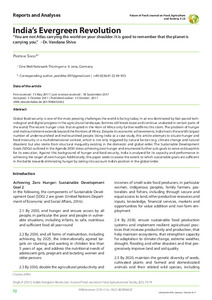| dc.date.accessioned | 2017-11-23T12:39:22Z | |
| dc.date.available | 2017-11-23T12:39:22Z | |
| dc.date.issued | 2017-10-15 | |
| dc.identifier.issn | 2197-411X | |
| dc.identifier.uri | urn:nbn:de:hebis:34-2017090653432 | |
| dc.identifier.uri | http://hdl.handle.net/123456789/2017090653432 | |
| dc.language.iso | eng | |
| dc.publisher | Department of Organic Food Quality and Food Culture at the University of Kassel, Germany and Federation of German Scientists (VDW) | eng |
| dc.rights | Urheberrechtlich geschützt | |
| dc.rights.uri | https://rightsstatements.org/page/InC/1.0/ | |
| dc.subject.ddc | 630 | |
| dc.title | India's Evergreen Revolution | eng |
| dc.type | Aufsatz | |
| dcterms.abstract | Global food security is one of the most pressing challenges the world is facing today. In an era dominated by fast-paced technological and digital progress in the agricultural landscape, famines still break loose and continue unabated in certain parts of the world. The recent hunger crisis that erupted in the Horn of Africa only further reaffirms this claim. The problem of hunger and malnourishment extends beyond the frontiers of Africa. Despite its economic achievements, India hosts the world’s largest number of undernourished and malnourished people. Using India as a case study, this article attempts to situate hunger and food insecurity in a multidimensional context, which is not only triggered by natural factors (e.g. climate change and natural disasters) but also stems from structural inequality existing in the domestic and global order. The Sustainable Development Goals (SDGs) outlined in the Agenda 2030 stress achieving zero hunger and enumerate further sub-goals to serve as blueprints for its execution. Against this background of hunger and food security, India is analysed for its capacity and performance in achieving the target of zero hunger. Additionally, this paper seeks to assess the extent to which sustainable goals are sufficient in the battle towards eliminating hunger by taking into account India’s position in the global order. | eng |
| dcterms.accessRights | open access | |
| dcterms.bibliographicCitation | In: Future of Food: Journal on Food, Agriculture and Society. Witzenhausen : University of Kassel, Department of Organic Food Quality and Food Culture. - Vol. 5, No. 2 (2017), S. 70-79 | |
| dcterms.creator | Singh, Pratibha | |

